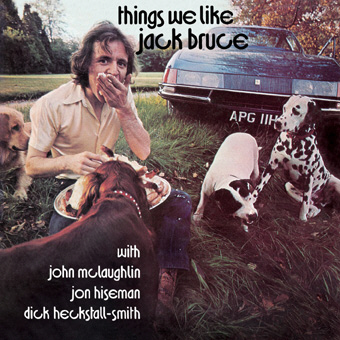
|
Things We Like Jack Bruce Over the Cliff Statues Sam Enchanted Dick (Medley: Sam's Sack Rill's Thrills) Born to be Blue HCKHH Blues Ballad for Arthur Things We Like * Ageing Jack Bruce: Upright bass John McLaughlin: Guitar Dick Heckstall-Smith: Saxes Jon Hiseman: Drums "Things We Like" is a critical album in understanding the development of jazz rock fusion, not necessarily for it's combination of acoustic jazz and electric rock (it doesn't) but more for the freedom of playing that it allows the musicians. It has an innocence shared by similar landmark albums like Chick Corea's "Tones For Jones Bones", McLaughlin/Surman's "Where Fortune Smiles", and especially Miroslav Vitous' "Infinite Search" and "Purple". McLaughlin is definitely touting a freeform freedom he would further explore in moving to Germany by November of that year to play with Gunter Hampel, and hints of his upcoming soloing genius on "Extrapolation", but he is also happy to take a back seat and provide that amazingly chunky comping like no other. Heckstall-Smith remembers McLaughlin turned up to Bruce's sessions after running into each other at Pete Brown's pad "with a guitar and an incredibly minute, fucked-up amp that made an incredibly minute, fucked-up noise which, when recorded and played back loud, sounded out of this world ... John just joined in without rehearsal." Bruce remembers it differently, that he saw McLaughlin skulking along, low after a sessionman gig for Decca, broke and with not enough money to get him to the US where Tony Williams was waiting for him to form Lifetime. This album gave him that financial opportunity. Whatever the circumstance, this was a journeyman already in search of a bigger meaning, pleased to learn from all contexts. Charles Mingus was supposed to be a major influence for the album's style, but followers of Ornette Coleman will definitely hear parallels, especially when Heckstall-Smith blows brass and woodwind simultaneously. Bruce's acoustic basslines have that Charlie Haden upturned finish too, quite unlike his electric playing. It is time-signature, pulsating modern post bebop at its best. Rarely ponderous, it gets down to the job fast and keeps the pace alive, lending most soloing space to sax, some exposure for guitar, little for the rhythm section. It's tight and mighty. However, the album was not a popular one. Firstly it was an in-your-face-as-far-as-you-can-get-away-as-possible-from-the-soon-to-be-disbanded-supergroup-Cream (it was recorded in August just before the Cream Farewell Tour of 22 shows at 19 venues in the United States between October 4 and November 4, 1968, and two final farewell concerts at the Royal Albert Hall on November 26, 1968). Even the album's title seems to make a statement about Bruce's preferred musical avenue over rock, and an attitude that some fans who may blame Bruce for the break up of Cream, consider salt in the wound. Or you could make the effort to find out the facts ("Things We Like" was the title of a grade school textbook Jack used as a boy), or you could read the title simply as an expression of joy to be among fellow-minded jazzers, old friends from the session underground, Soho pubs and London club scene, who have gathered to realise one of Jack's dreams of recording his long-penned (since age 11!) pieces that Cream could never have played like they needed to be played. He was afterall just going back to what he used to do before Cream. And thank goodness for his strength of character, rather than selling out to the temptation of repeating the rock success, he refused the money and concentrated on songwriting to produce "Songs For A Tailor" an amazing showcase of his melodic lyrical playing and singing style. This is not an essay on Bruce's career, so suffice to note that his and John McLaughlin's paths soon crossed again in Tony William's Lifetime and on "Escalator Over The Hill", but thank goodness they had this outing. Wonderfully exciting, memorable tunes that point to jazz's future paths like the other landmark exploratory albums of the time. By building on the old-world legacy, incredibly and minutely.
|